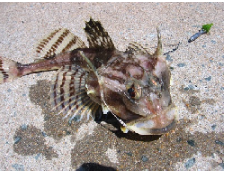
The snailfishes or sea snails are a family of marine ray-finned fishes. These fishes make up the Liparidae, which is classified within the order Scorpaeniformes.
Notoliparis is a genus of marine ray-finned fish belonging to the family Liparidae, the snailfishes. These fishes are found in deep Oceanic trenches in the South Atlantic South Pacific and Southern Oceans.
Aetheliparis rossi is a species of snailfish only known from the mesopelagic zone in the North Atlantic off Cape Hatteras, North Carolina. This species is found at depths of from 500 to 674 metres.

Liparis montagui, or Montagu's seasnail, is a marine fish of the seasnail family (Liparidae). It inhabits the northeastern Atlantic, mainly around the British Isles, the North Sea, the Norwegian Sea, southern Iceland and as far north as the Barents Sea. It is a small, demersal fish, usually living between from the intertidal zone to 30 metres deep, where it hides under stones or algae. It mainly feeds on small invertebrates, such as small crabs, shrimp and amphipods. This species was described in 1804 by the Anglo-Irish writer, natural history illustrator, and amateur zoologist Edward Donovan with England given as the type locality. The specific name honours the English naturalist George Montagu who provided Donovan with an illustration and a description of this "beautiful little fish".

Liparis fabricii, commonly known as the gelatinous seasnail or gelatinous snailfish, is a benthopelagic species of snailfish from the Arctic Ocean. It has a tadpole-like body with a maximum length of about 20 cm (7.9 in). It is brown to black in coloration with a distinctive dark peritoneum. It preys on small crustaceans and marine worms. It is not commercially important, though it is a valuable food source for predatory fish and seabirds in the Arctic region.

Liparis is a large genus of snailfish from the northern hemisphere. They are very common in temperate and cold waters. Chernova (2008) has proposed that the genus should be subdivided into five subgenera: Liparis, Neoliparis, Lycocara, Careliparis, and Lyoliparis.

Liparis liparis, the common seasnail, striped seasnail or seasnail, is a small species of marine ray-finned fish belonging to the family Liparidae, the snailfishes, in the order Scorpaeniformes, the scorpionfishes and flatheads. It is found in the northeastern Atlantic Ocean where it lives on the seabed.
Allocareproctus is a genus of marine ray-finned fishes belonging to the family Liparidae, the snailfishes. These fish are found in the northern Pacific Ocean.
The hardhead snailfish is a species of marine ray-finned fish belonging to the family Liparidae, the snailfishes. This species is found in the northern Pacific Ocean where a single specimen was collected in June 2000 from near the Aleutian Islands at a depth of 285 m (935 ft). The length of the fish was 3.3 cm (1.3 in) SL. This species is the only member of the monospecific genus Lopholiparis. The specific name honors the collector of the holotype, William C. Flerx of the National Marine Fisheries Service.

Artediellus atlanticus, the Atlantic hookear sculpin or hookhorn sculpin, is a species of marine ray-finned fish belonging to the family Cottidae. This species is found along the coasts of Northern Atlantic Ocean.

Liparis gibbus, the polka-dot snailfish, variegated snailfish or dusky snailfish, is a species of marine ray-finned fish belonging to the family Liparidae, the snailfishes. This fish is found in Arctic waters. Juveniles of the species have been found to be biofluorescent.
Psednos struthersi is a species of snailfish found in the south-western Pacific Ocean.
Psednos whitleyi, the bigcheek snailfish, is a species of snailfish found in the eastern Indian Ocean.
Psednos nataliae is a species of snailfish found in the eastern Indian Ocean.
Paraliparis tangaroa is a species of snailfish found in the Southern Ocean.
Paraliparis voroninorum is a species of snailfish found in the Southern Ocean.
Paraliparis freeborni is a species of snailfish found in the south-western Pacific Ocean.
Paraliparis csiroi, the loweye snailfish, is a species of snailfish found in the eastern Indian Ocean.
Paraliparis dewitti, the brown ribbed snailfish, is a species of snailfish found in the eastern Indian Ocean.
Paraliparis vaillanti is a species of snailfish found in the north-western Atlantic Ocean primarily in the Laurentia Channel, between Newfoundland and Cape Breton.








